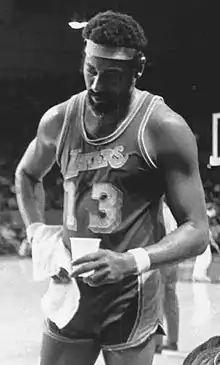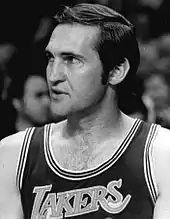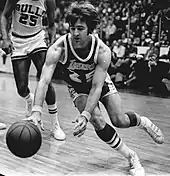Superteams in the National Basketball Association
A superteam in the National Basketball Association (NBA) is a team that is viewed as significantly more talented than the rest of the teams in the league. There is no official distinction, but it is generally viewed as a team that has at least 3 Hall of Fame, All-Star, or All-NBA caliber players that join forces to pursue an NBA championship.[1] The most well-known examples of superteams are the "Big Three" of the Miami Heat and the "Hamptons Five" of the Golden State Warriors.
Definition
There is no exact definition of an NBA superteam, and NBA fans disagree on what constitutes a superteam. Some NBA fans define superteams by the talent on the roster, while others define them by the playoff success they have. The origin of superteams is also debated. Some NBA fans view superteams as a relatively new concept that started with the 2008 Celtics and the “Heatles”. Others contend that superteams have always existed in the NBA, dating back to Bill Russell's Celtics and the 1969 Los Angeles Lakers with Wilt Chamberlain, Jerry West, and Elgin Baylor.
The general conception of a superteam is a team with at least 3 perennial All-Stars that joins the team through free agency or trades rather than the NBA draft. Examples of this are the 2007–2012 Boston Celtics (Paul Pierce, Kevin Garnett, and Ray Allen) and the 2010–2014 Heat (LeBron James, Dwyane Wade, and Chris Bosh). Some fans classify any “big three” of perennial All-Stars as a superteam even if the team was built primarily through the draft. This would include the 1995-1998 Chicago Bulls (Michael Jordan, Scottie Pippen, and Dennis Rodman) and the 1980s Celtics (Larry Bird, Kevin McHale, and Robert Parish). Another conception is when an MVP-caliber player joins a team that is already a legitimate title contender. Examples of this are Moses Malone joining the Philadelphia 76ers in 1982 and Kevin Durant joining the Golden State Warriors in 2016. A broader conception is any team that wins multiple championships with a noticeably more talented roster than the rest of the league. Examples of this are the Showtime Lakers and the 2000s Lakers led by Shaquille O’Neal and Kobe Bryant.
It is also debated if "failed superteams" should truly be classified as superteams. A failed superteam is essentially an attempt to unite perennial All-Stars that doesn't result in a championship. Injuries and clashing teammates are the primary reasons these teams fail to live up to expectations. Examples of this are the 1996-1999 Houston Rockets (Hakeem Olajuwon, Charles Barkley, and Clyde Drexler who was later replaced by Scottie Pippen), the 2013 Lakers (Kobe Bryant, Pau Gasol, Steve Nash, and Dwight Howard), and the 2021 Brooklyn Nets (Kevin Durant, Kyrie Irving, and James Harden).
Notable Superteams
1968–1973: Los Angeles Lakers
The earliest example of a superteam is when superstar Wilt Chamberlain joined fellow superstar players Jerry West and Elgin Baylor, on the Los Angeles Lakers in the 1968 offseason.[2][3][4]
1982–1986: Philadelphia 76ers
On September 15, 1982, restricted free agent Moses Malone was acquired by the Philadelphia 76ers in a sign-and-trade with the Houston Rockets for Caldwell Jones and a 1983 1st round draft pick (Rodney McCray was later selected). The 76ers achieved a 65–17 record, made it to the NBA Finals and swept the defending champions Los Angeles Lakers. The following season, the 76ers had a 52–30 record and were upset in the First Round by the New Jersey Nets. In the 1984 NBA draft, the 76ers drafted Charles Barkley with the 5th overall pick. With the inclusion of Barkley, the 76ers improved to a 58–24 record compared to the previous season. They made it to the Conference Finals where they were eliminated by the defending champions Boston Celtics in 5 games. The Celtics went on to get eliminated in the NBA Finals in 6 games against the Los Angeles Lakers. The following season, the 76ers had a 54–28 record and were eliminated in the Conference Semifinals by the Milwaukee Bucks in 7 games. In the offseason, the 76ers traded Moses Malone along with Terry Catledge, a 1986 1st round draft pick (Anthony Jones was later selected), and a 1988 1st round draft pick (Harvey Grant was later selected) to the Washington Bullets for Cliff Robinson and Jeff Ruland, ending the superteam era of the Philadelphia 76ers.
2007–2012: Boston Celtics
Following a lackluster 2006–2007 season, finishing 24–58, the Celtics sought a new move to propel them to the top of the league.[5] Following the end of the season, during the summer of 2007, Danny Ainge made a blockbuster move. "On draft night, he traded No. 5 pick Jeff Green, Wally Szczerbiak and Delonte West to Seattle for perennial all-star Ray Allen and Seattle's second-round pick (which the team used to select LSU's Glen "Big Baby" Davis). The Celtics then traded Ryan Gomes, Gerald Green, Al Jefferson, Theo Ratliff, Sebastian Telfair, and a first-round draft pick to the Timberwolves in exchange for superstar power forward Kevin Garnett. These moves created a new "Big Three" of Pierce, Allen, and Garnett."[6] This new "Big Three" created the most drastic record changes in NBA history seeing them finish 66-16 for the season en route to the 2008 NBA Championship.[7][8]
2010–2014: Miami Heat
In the 2010 offseason, LeBron James entered free agency with free choice of his next team. He had just come off one of the best statistical seasons of his career, been voted All-Star six times, and won back-to-back MVP awards with the Cleveland Cavaliers.[9][10] Although there was much speculation and hype surrounding James and his choice, it was kept hidden for many weeks until he announced his plans on a live ESPN broadcast, The Decision.[11] He chose to join the Miami Heat and fellow draft class member and good friend, Dwyane Wade.
Wade had already proven himself a superstar with the Miami Heat where he won the 2006 NBA Championship and Finals MVP. His other achievements included 6-time All-Star, 5-time All-NBA teamer, 2009 scoring champion, and 2010 All-Star MVP. Chris Bosh, another member of their draft class, would also join James and Wade, then a 5-time All-Star and franchise all-time leader in points, rebounds, blocks, and minutes played at the time he left the Toronto Raptors.
The Heat made 4 straight NBA Finals from 2011–2014. They lost the 2011 NBA Finals to the Dallas Mavericks before winning two straight over the Oklahoma City Thunder and the San Antonio Spurs respectively. During this time, they made NBA history with such feats as 27 straight victories from February 3 to March 25, 2013, the second-longest win streak in NBA history,[12] as well as only the second time that three teammates had each scored 30 points and grabbed 10 rebounds in a regulation match, which had last happened over 50 years prior.[13]
In the 2014 Finals, the Heat lost to the Spurs in 5 games in a rematch of the previous Finals. Following the loss, LeBron James reentered free agency and returned to his hometown team, the Cleveland Cavaliers, thus ending the run of the Miami Big Three.
Many other players and franchises would follow in the footsteps of the Big Three by joining other superstar players to form their own superteam in a quest to win a championship.[14] However, it would be LeBron James himself who formed the next "big three" of the league, joining forces with Kyrie Irving and Kevin Love.[15][16]
2016–2019: Golden State Warriors
In the 2016 offseason, after blowing a 3–1 lead to the Cavaliers in the 2016 Finals, the Warriors made a move to re-assert their spot as the most dominant franchise in the league by acquiring Kevin Durant in free agency.[17] Durant had been a member of the Oklahoma City Thunder and was part of the team that had led the Warriors 3–1 in the Western Conference Finals, but then blew the lead and missed out on their first conference championship since 2012.[18] Durant joined the Warriors highly decorated and as one of the best players in the league with a resume of 2014 MVP, four-time NBA Scoring champion, seven-time All-Star, 2012 All-Star MVP, and six-time All-NBA teamer.[19][20]
Before the playoffs, the Warriors had matched or broken several NBA records. They reclaimed the top seed with 67 wins along, won the most ever games by a 40-point-plus margin, and extended their run of most games without back-to-back losses in the regular season to 146 (spanning from April 9, 2015, to March 2, 2017).[21][22] They tied the record for most players in the All-Star game with 4 (Durant, Stephen Curry, Klay Thompson, and Draymond Green).
In the postseason, the Warriors broke the records for best start (15–0), longest win streak (15), and best overall record (16–1). They swept the Western Conference Playoffs 12–0 before eliminating the Cavaliers in the Finals in 5 games.[23][24]
In 2018, the Warriors were unable to reclaim the league's best record after 3 straight years of doing so. They eliminated the San Antonio Spurs and the New Orleans Pelicans each in 5 games before narrowly beating the 1st-seeded Houston Rockets in 7 games in the Western Conference Finals.[25] They swept the 2018 Finals over Cleveland to win a second straight title, and 3 titles in 4 years.[26][27]
In the 2018 offseason, the Warriors signed DeMarcus Cousins as a free agent. Although he was injured then, he was still considered a dominant "big man" with great skill and defensive tenacity, which had won him two All-NBA selections and four All-Star games before the signing. The Warriors became the first franchise in 42 years to be able to start five All-Stars (as they had all been the previous year), one in each floor position.[28][29][30]
The Warriors reclaimed the 1st seed in the Western Conference with a 57–25 record and made it to their 5th straight NBA Finals. However, they lost the 2019 Finals in 6 games to the Toronto Raptors (led by Kawhi Leonard).[31] The Warriors were plagued by injuries, with Kevin Durant missing playoff games with a calf injury and an Achilles tear, and Klay Thompson suffering hamstring and ACL injuries in the Finals. In the 2019 offseason, Durant joined the Brooklyn Nets in a sign-and-trade deal, officially ending the superteam era of the Warriors.
Notable Failed Superteams
1996–1997: Houston Rockets
On August 19, 1996, NBA superstar Charles Barkley was traded by the Phoenix Suns to the Rockets for Chucky Brown, Mark Bryant, Sam Cassell, and Robert Horry. This trade formed a superteam of Hakeem Olajuwon, Charles Barkley, and Clyde Drexler. The Rockets achieved a 57–25 record, made it to the Western Conference Finals and lost to the Utah Jazz in 6 games.
2003–2004: Los Angeles Lakers
Lakers, with Kobe Bryant and Shaquille O'Neal, had won three consecutive titles from 2000 to 2002. The 2003-04 Lakers, which already featured O'Neal and Bryant, signed Gary Payton and Karl Malone, who were both in the quest for their first championship. Instead of improving, the Lakers suffered of locker room trouble. O'Neal unsuccessfully demanded a pay rise, while Bryant missed several games due to a sexual assault trial in which he was eventually acquitted. Lakers would lose 4-1 in the NBA Finals against the Detroit Pistons. After the loss, the team was dismantled: coach Phil Jackson resigned (but eventually returned), Malone retired, and O'Neal and Payton were traded. The Lakers would not qualify for the 2005 playoffs and did not become a title contending team until they acquired Pau Gasol in 2008.
2012–2013: Los Angeles Lakers
On July 11, 2012, Steve Nash was traded by the Phoenix Suns to the Lakers. On August 10, 2012, NBA superstar Dwight Howard was traded by the Orlando Magic to the Lakers in a 4-team trade. This trade formed a superteam of Kobe Bryant, Dwight Howard, Steve Nash, and Pau Gasol. The Lakers dealt with injuries, with Gasol only playing 49 games due to a foot injury and Steve Nash only playing 50 games due to a leg injury. On April 12, 2013, Kobe Bryant tore his achilles in a game against the Warriors. Due to the injuries, the Lakers finished with a 45–37 record and were swept in the First Round by the Spurs.
2020–2023: Brooklyn Nets
Near the start of the 2020–21 season, on January 13, 2021, the Brooklyn Nets traded for James Harden in a blockbuster four-team trade, which reunited Harden with his Oklahoma City Thunder teammate Kevin Durant, and also gave him All-Star Kyrie Irving to form a new superteam in the East.[32] However, this team struggled due to various injuries to Durant, Harden, and Irving, and were eliminated by the eventual champion Milwaukee Bucks in Game 7 in overtime of the Eastern Conference Semifinals. Harden was ultimately traded to the 76ers in the following season for a package headlined by All-Star Ben Simmons.[33] With Simmons sitting out of the season due to struggles with mental health, the Irving and Durant led team finished 7th in the conference, surviving the play-in tournament against the Cavaliers before being swept by the eventual Conference champion Celtics in the first round.[34] In 2023, Irving requested a trade from the Nets and was traded to the Dallas Mavericks. Following Irving's trade to the Mavericks, Durant was subsequently traded to the Phoenix Suns.
Controversy
There has been some controversy about superteams in the NBA. Claims persist that superstar players are no longer looking to make the game competitive, but rather finding an easier way to win championships and nullifying smaller contenders by joining other elites.[35] From James joining the Heat to Durant joining the Warriors, there has been derision from the media and fans in their efforts to unbalance the NBA.[36] However, there have been cases for both sides as others argue that the NBA has achieved its highest grossing TV revenue, that it was all done under the rules of the salary cap, and that it is enjoyable sports entertainment.[37]
See also
References
- "What Should the NBA Do When Nobody Can Touch the Superteams?". GQ. May 23, 2017. Retrieved 2019-05-17.
- Lynch, Andrew; ET, 2017 at 8:35a (2017-06-16). "The history of NBA superteams, from Wilt Chamberlain to the 2017 Warriors". FOX Sports. Retrieved 2020-10-07.
- Dan Woike (July 20, 2018). "1968: Lakers' first 'Big 3' didn't deliver immediate banner". Los Angeles Times. Retrieved May 24, 2022.
- "Lakers JERRY WEST EXPLAINS What Went Wrong with NBA's 1st SUPER TEAM". YouTube. November 7, 2021. Retrieved May 24, 2022.
- "2006-07 Boston Celtics Roster and Stats". Basketball-Reference.com. Retrieved 2021-12-01.
- "Boston Celtics", Wikipedia, 2021-11-30, retrieved 2021-12-01
- "2008 NBA Finals – Lakers vs. Celtics". Basketball-Reference.com. Retrieved 2021-12-01.
- "2007-08 Boston Celtics Roster and Stats". Basketball-Reference.com. Retrieved 2021-12-01.
- "LeBron James Stats". Basketball-Reference.com. Retrieved 2019-05-17.
- "NBA MVP Award Winners". NBA.com. Retrieved 2019-05-17.
- "Trifecta: LeBron will join Wade, Bosh with Heat". ESPN.com. 2010-07-08. Retrieved 2019-05-17.
- "NBA Longest Winning Streaks - Regular Season". Land of Basketball. Retrieved 2020-11-01.
- Russell, Adrian. "Miami's 'Big 3' put together historic stat night". The42. Retrieved 2019-05-19.
- "Next NBA superteam? Nine teams to watch". ESPN.com. 2017-07-31. Retrieved 2019-05-17.
- "The Big 3 starts and ends with LeBron James". ESPN.com. 2010-10-26. Retrieved 2019-05-19.
- Gallo, D. J. (2017-06-05). "LeBron James created the modern NBA superteam. Now it will destroy him". The Guardian. ISSN 0261-3077. Retrieved 2019-05-19.
- "Durant joins Curry, will sign deal with Warriors". ESPN.com. 2016-07-04. Retrieved 2019-05-20.
- "Oklahoma City Thunder Playoff History - RealGM". basketball.realgm.com. Retrieved 2019-05-20.
- Spears, Marc J. (2016-07-04). "'Strength in Numbers' convinced Kevin Durant to join Warriors". Andscape. Retrieved 2019-05-20.
- "NBA Players: Kevin Durant Profile and Basic Stats". www.landofbasketball.com. Retrieved 2019-05-20.
- "NBA Teams: Golden State Warriors Records Year by Year". www.landofbasketball.com. Retrieved 2019-05-20.
- ""Warriors"" (PDF). nba.com.
- Hoffman, Benjamin; Ma, Jessia; Pearce, Adam; Ward, Joe (2017-06-17). "The Golden State Warriors' Record-Setting Postseason". The New York Times. ISSN 0362-4331. Retrieved 2019-05-20.
- "2017 NBA Playoffs Summary". Basketball-Reference.com. Retrieved 2019-05-20.
- "2018 NBA Playoffs Summary". Basketball-Reference.com. Retrieved 2019-05-20.
- "Warriors prove super teams can be built through the NBA Draft - Sportsnet.ca". www.sportsnet.ca. Retrieved 2019-05-20.
- "Warriors vs. Cavaliers - Game Recap - June 9, 2018 - ESPN". ESPN.com. Retrieved 2019-05-20.
- Jeva Lange (July 3, 2018). "The Golden State Warriors will be the first team in over 40 years to be able to start 5 All-Stars". The Week. Retrieved March 1, 2021.
- Connor Letourneau (February 12, 2019). "Warriors' five-All-Star lineup looks to work out early kinks". San Francisco Chronicle. Retrieved March 1, 2021.
- Fromal, Adam. "Warriors Redefine the Superteam Again with DeMarcus Cousins Signing". Bleacher Report. Retrieved 2019-05-20.
- "2019 NBA Playoffs Summary". Basketball-Reference.com. Retrieved 2023-02-08.
- "Brooklyn-bound: Nets land Harden in blockbuster". ESPN.com. 2021-01-13. Retrieved 2021-01-14.
- "Nets trade James Harden to Sixers for Ben Simmons". www.nba.com. Retrieved 2022-06-28.
- The Athletic Staff. "Boston Celtics sweep Brooklyn Nets". The Athletic. Retrieved 2022-06-28.
- Ryan, Shane. "Until the NBA breaks up its "super teams," it is basically just European soccer". Golf Digest. Retrieved 2019-05-21.
- Berger, Ken. "Who's to Blame for the Warriors Bringing NBA Teams to Their Knees?". Bleacher Report. Retrieved 2019-05-21.
- "Why Kevin Durant and the Warriors aren't to blame for the NBA's Superteam problem". USA TODAY. Retrieved 2019-05-21.


.jpg.webp)














.jpg.webp)
_(cropped).jpg.webp)
.jpg.webp)
.jpg.webp)





.jpg.webp)

.jpg.webp)
.jpg.webp)